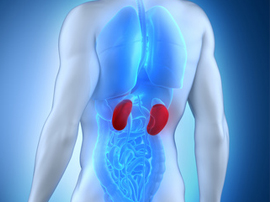Chronic kidney disease is the gradual loss of kidney function over the course of several years. There are five stages going from Stage 1 (mild) to Stage 5 (end-stage renal failure). These are monitored with a measurement known as the glomerular filtration rate, or GFR, which tells how efficiently the kidneys are filtering waste from the blood.
The GFR is based on age, race, gender, and blood level of creatinine, a waste product that healthy kidneys remove.
When the kidneys are working properly, the level of creatinine is low. But as kidney function
decreases, the level creeps higher. Normal GFR creatinine ranges are from 90 to 120. Older people normally have lower GFR levels because GFR decreases with age.
Creatine levels below 60 for three or more months are a sign of chronic kidney disease.
The GFR does not, however, confirm a diagnosis of kidney failure in people who are not known to have it, but it is an indication that kidney failure could be occurring.
Other factors can affect the GFR, such as obesity and the amount of muscle mass a person has. So if your GFR shows an abnormal result for the first time, your doctor may recommend that it be retested in a few months.
One of the problems with chronic kidney failure is that in the early stages, it shows no symptoms. That means it can begin to damage the kidneys without a person becoming aware of it. In fact, it often shows no symptoms until Stage 3 or even later.
There is no cure for kidney disease, and Stage 5 — end-stage renal failure — requires a patient to undergo dialysis, a procedure in which waste and excess water is removed from the blood outside of the body.
But prompt treatment and adherence to lifestyle changes, including proper diet, regular exercise, and quitting smoking can help mitigate the damage to the kidneys and keep them functioning much longer.
Just as with heart disease, the best way to prevent kidney disease begins by knowing the risks. Most of the risk factors for kidney disease are the same for heart disease.
In fact, having either kidney or heart disease is a major risk factor for the other.

